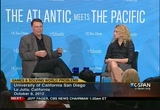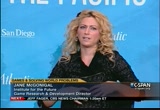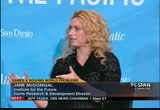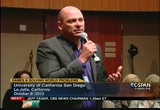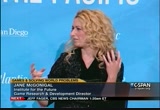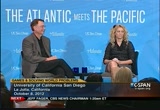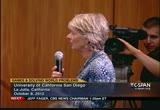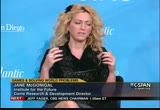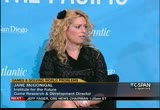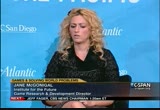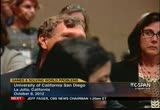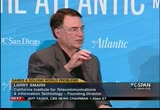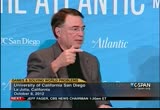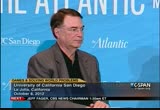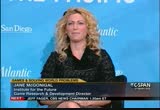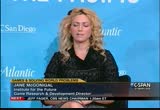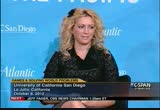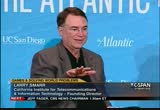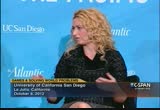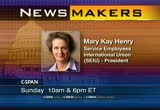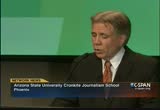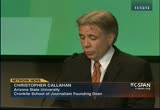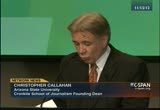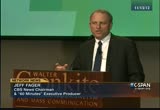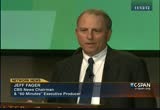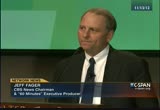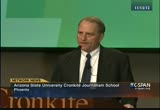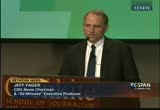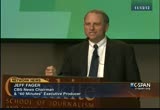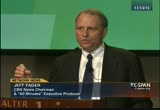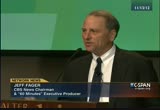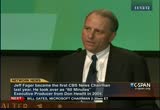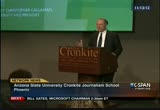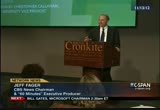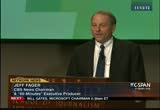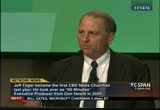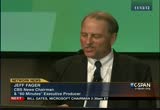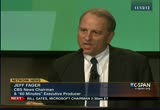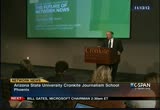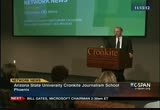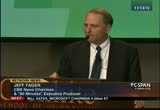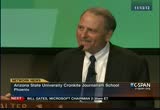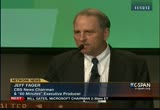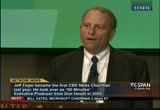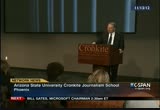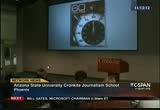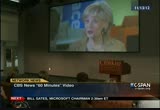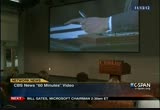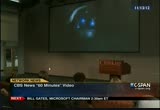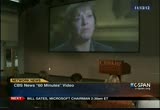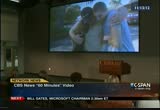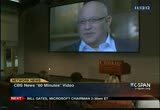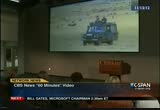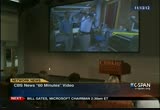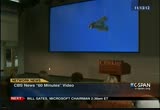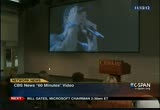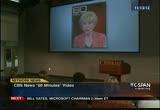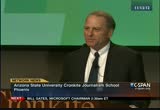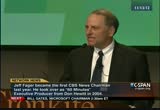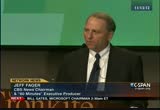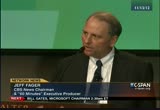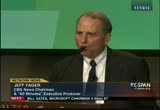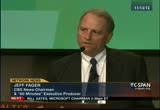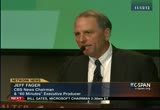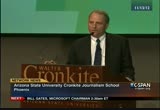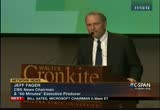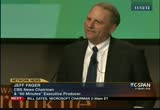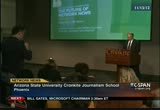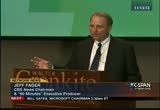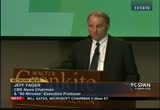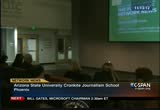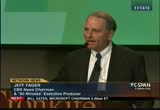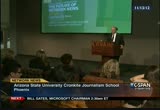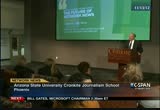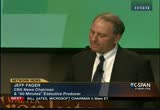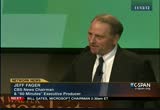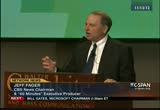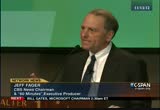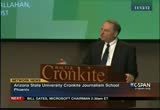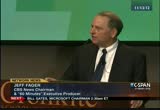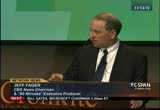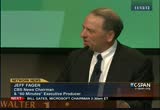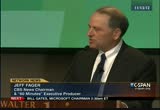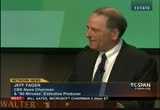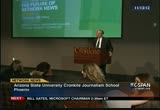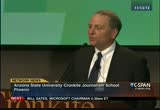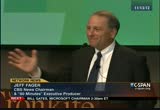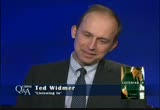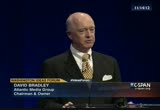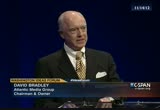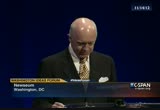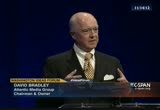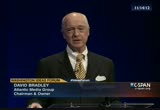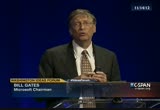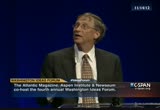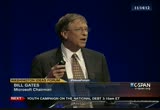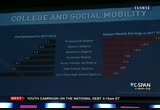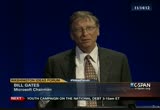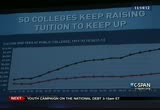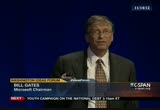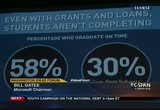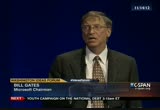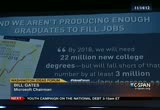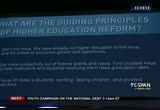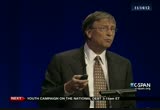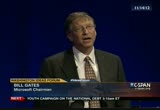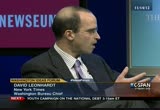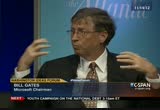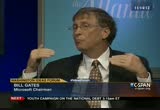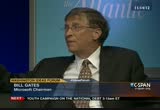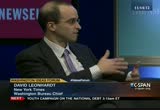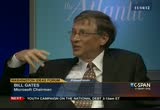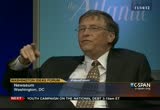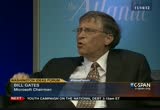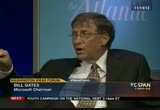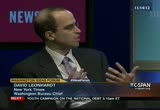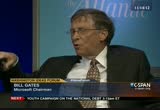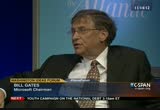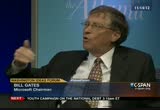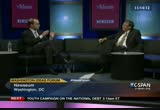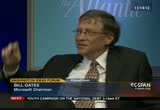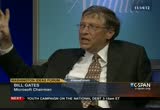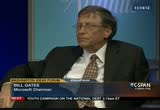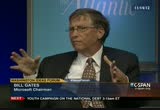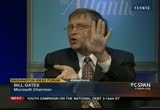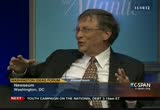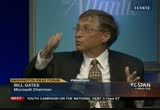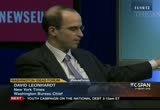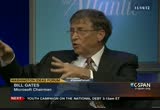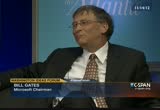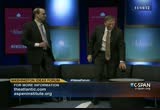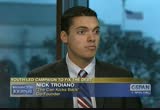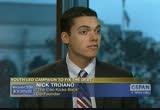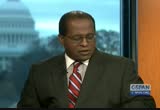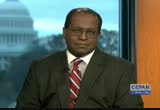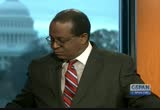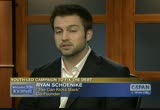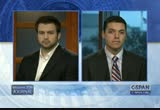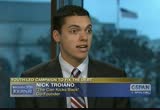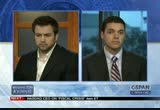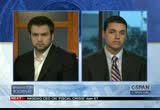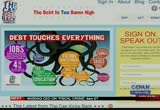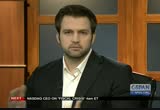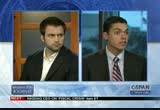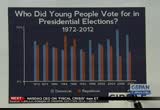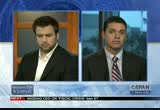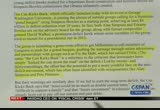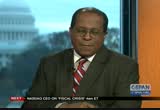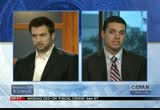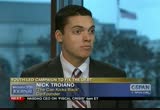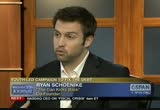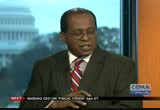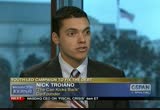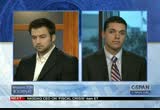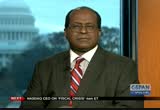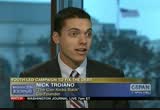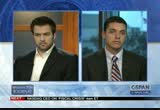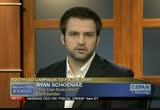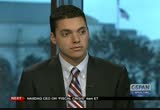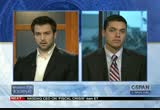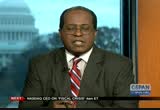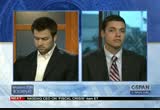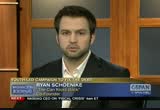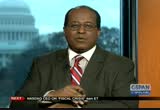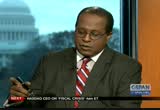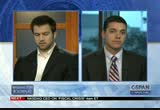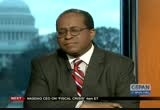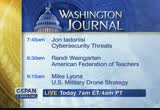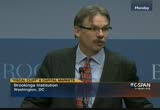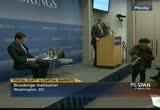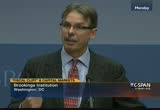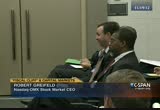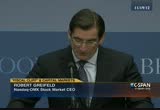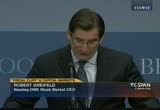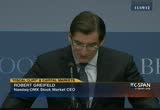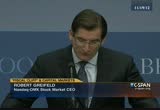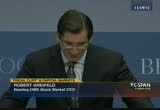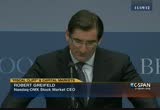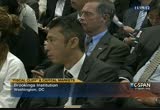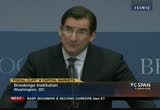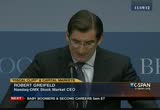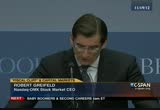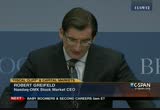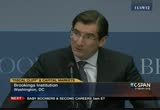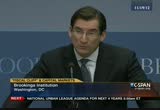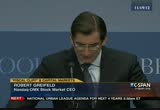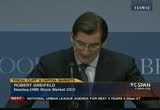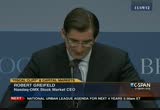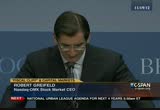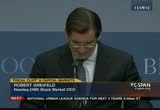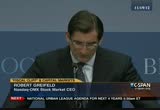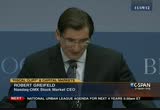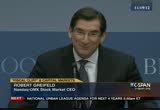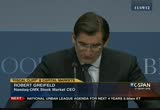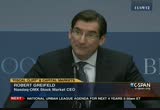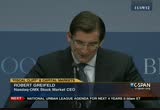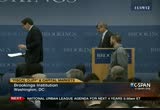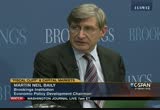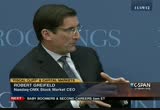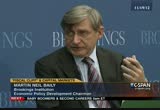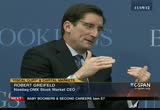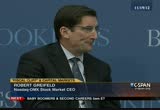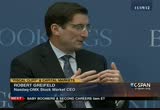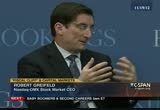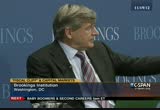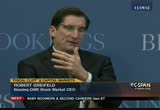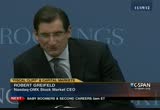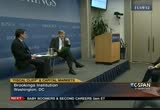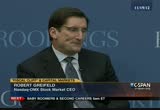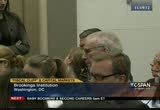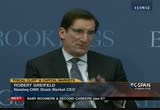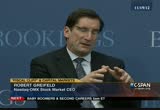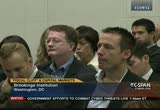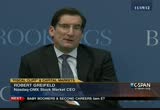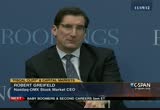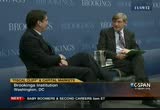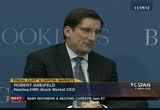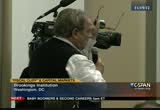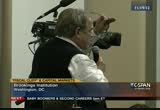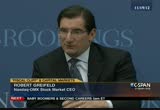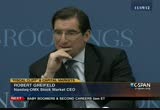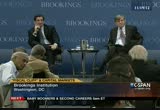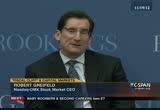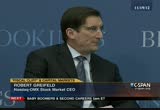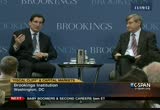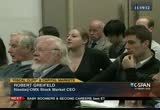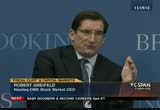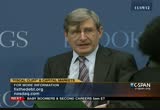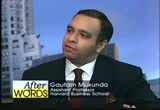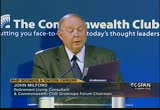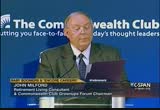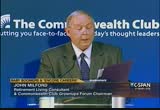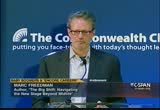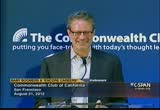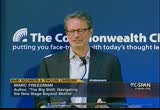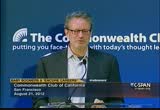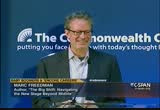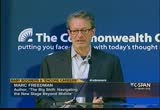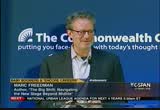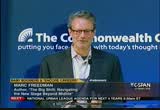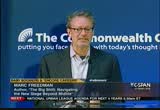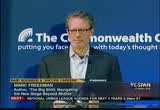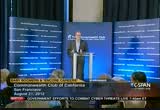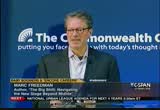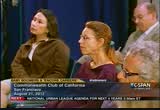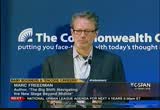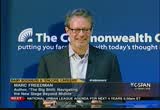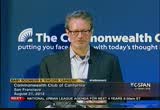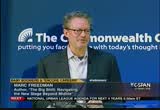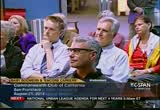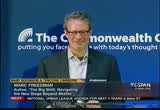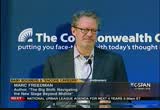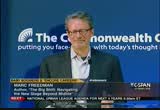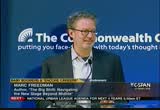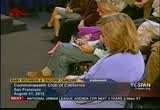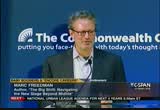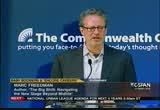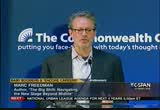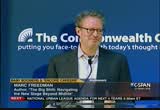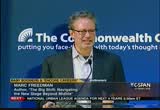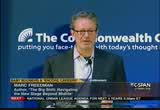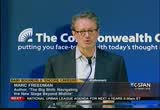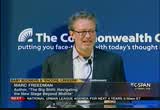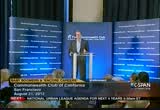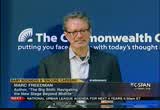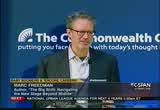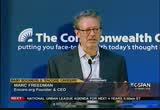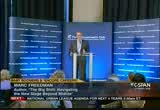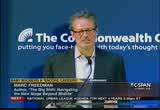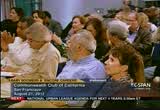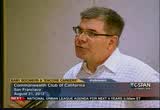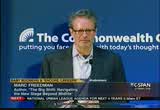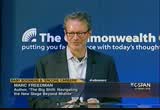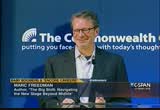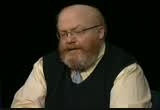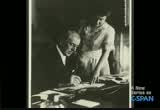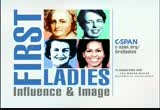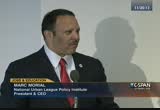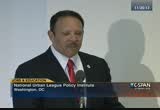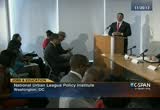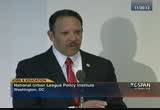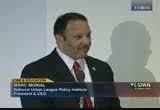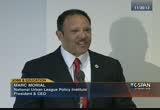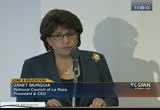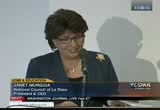tv Washington This Week CSPAN November 25, 2012 1:00am-6:00am EST
1:00 am
computer -- the big things like amazon, google earth, these folks are adding like a million cores a year. i do not think anyone has any idea how bad this is said it continues to escalate, so the ability to have that power on you, that is a world we have never been in before. >> the key thing about emotional resilience is it does not matter where the emotions come from. i have been doing this work for more than a decade, and one of the most confounding critiques the fields listed in it, i have been struggling is whether it is legitimate or not. what happens in games is not real, so even if we feel good company and we will leave the game -- it is not a real achievement.
1:01 am
it does not really move us forward in our lives, so it does not count, but now we know from research on positive emotions that it does not matter where you get these sources of promotions, so that is why you see all these studies of games and improving longevity, declining demand share, in approving relationships between parents and kids. new -- declining dimensia, improving relationships between parents and kids. they have done studies with kids in hospitals. they can lower their anxiety. you can help posttraumatic stress disorder just by having somebody play a game like temptress-- tetris 24 hours after an event. there are so many interactions we have i think we can put
1:02 am
aside this idea that what happens in the game stays in the game. >> if you think there is reality, it is all in your brain. your visual cortex is working with your auditory cortex to create what you think is reality. there may be one, but what we have in our brains is as virtual as what is on the web. let's open it to questions. we have mike. >> good afternoon. i am ted walter from the san diego zoo, and i have lots of pictures of baby animals, and you can spend 30 seconds or more. we have a live camera on our baby panda, and you can get that through a free app, not that i want to promote that. it seems like is good for your help. i am most interested in trying to find ways to preserve wildlife.
1:03 am
i was really intrigued by the concept. how would somebody like me or my organization go about constructing a game like this to get people involved in a solution so we are not alone in this planet? where would we start? >> i set up a zoo with some game developers a couple years ago, so this works that you can do this. there is an organization to curate examples and also help matchmaker between organizations and developers, and within that group as a social network are foundered -- i founded. people think gamers' are playful, and they are not.
1:04 am
gamers are so serious and goal oriented and strategic and take it seriously. in many ways it does not feel playful at all, so i refuse to use that word. it is a social network for people to find each other, so that is a good place to start. for anyone thinking, how do i get involved, if you do a web search for games for zoo, climate change -- i think we could play a game right now where you could give me five things and there would be a case example for every single. search for the most random thing, and there should been a case id, and people are very
1:05 am
generous in helping out, especially university students. all the time i get organizations to recruit, so there are so many young people interested in games for good. >> i have a development background. i used to be with the world bank. my question is the you think games can be used to help people deal with abstract concepts? we find there are views that poverty is a state of mind, and when you listen to suzy ormond talk about financial literacy, you see there is an emotional content into financial problems, and the argument is people who are perpetually in financial trouble are having trouble dealing with emotional relationship with money, so my question to you is you think games can be used to help
1:06 am
people deal with that emotional relationship with what is basically an abstract concept? >> yes, there are so many examples where people are looking at games with poverty and games of money. one of my favorite examples was a group out of new york city called the area code. if you are looking at lots of examples of creative solutions to problems, is one to look at. they did a game around money where communities in the south that have high rates of mortgage defaults, and low rates of savings, and they made up a currency called macon money. macon, georgia, so they had macon money.
1:07 am
ads in dollar bills but all of them have been cut in half. they gave out all this money, but they were all half a dollar bill. the currency could be used in local stores in services like cash, but you had to find the other person with half of your bill, and they created a social gaming environment where you could meet up. if we met in a coffee shop we could use its air, and it created a social layer and physical community to transform the community and also bring positive of motions, that you have solved this problem and have success, and it is really interesting. basically, my answer is yes. there are so many crazy things you can thing to do with a game design that bring in positive emotions and physical
1:08 am
environments around even really abstract questions. >> in the back. >> my question is there a gino type associated with gamers? is there anyone who has found a genetic profile? >> around to different types of games, yes. i thing. i will not pretend to understand exactly what genes are being expressed or how, but at the gender level, we know the boys tend to be more motivated by game environments where mastery is emphasized, certainly competitive environments, but even competition, whereas girls
1:09 am
almost universally are spending time in environments where there is collaboration, exploration, discovery. that is interesting, because we start to do game designs for solving real world problems, and you have to think about how different types of people are drawn to different types of games and motivated differently, motivated through social solutions, and i am sure you could dig deeper and find actual variations in the code. >> we just need to do a matchup between your genetics and gamers. >> i was curious if you have any sponsors on -- thoughts on google now and is there going to be any changes around that? >> huge.
1:10 am
one of the biggest next changes in the nature of the cloud is it is going to become much more intelligent. there was an article that came out yesterday about google using massive amounts of computing but also massive amounts of data to improve neural networks, and they said they are getting a 25% increase in voice recognition accuracy just doing that. this is one of the gift that keeps on giving, because of more computing it takes to support users, the more this capability grows, so i have said for some time, imagine there is a service that if you're building an app you can tap into that is intelligent,
1:11 am
but has predictive capability, and there are all kinds of artificial intelligence methods, or other things that can take a advantage of this, but i think that is going to be like a laser that you build apps on top of the cloud. that is something you need to tap into. it gives a huge amount of things. imagine five years from now. i think it will astonish you how intelligence this community becomes. watson was on a small set of computers. it is a lot of data for a human, but compared to a week, not much data. watson is going through the
1:12 am
cloud, and they are putting in all the medical textbooks and things like, so this is one of the biggest trends i see coming in the cloud, for it to become much more intelligent and for you to have -- we use to talk about smart pets. i am more into virtual pets than literal. you do not have to clean of the litter box, but these things -- there are a lot of robots from japan's that have done this, but i think you are going to have multiple personalities for you in the cloud that become a part of you. we are going to have a split personality, and it will get stronger and better every day.
1:13 am
in the back. >> i have two questions. can you recommend a game for those of us over 60 who have never played a game? second, the disconnect between physicality and sedentary nature of games, particularly if you are doing something 20 hours a week? >> i think mine craft is the coolest game to check out right now. you can play it on any computer, so that is an easy place to start, and what is great about it is it is kind of like lagos where you build whatever you want, except imagine evil monsters to destroy whatever you tried to build. >> like brothers.
1:14 am
>> there is all kinds of architecture and design, but you can also wander around and see what other people have built. new appreciate them. it is great, and it is really easy to get into. if you need an edge, go to ruth youtube and search for -- go to youtube and search for mindcraft. there are a lot of tutorials. that is where i would begin. the physical nature is something games are working on. obviously we have these physical games like wii, which does a decent job but probably will not replace physical activity. what we are hoping is that it serve effectively as a gateway or springboards to physical activity.
1:15 am
there is lots of research around self efficacy that happens in gaming, where if you have a successful experience, that it changes your perception or increases your likelihood of doing something physically active in the real world, particularly if you have an avatar in the game that looks like you, so it amplifies how often you are. stanford has the best research on that, so i think to think of the physical aspect of the game as being a gave way to real activity is important, and a lot of folks in the gaming industry are just reminding gamers' to stand up for the last 10 minutes of any game they are playing, because you can play almost any game standing of, and it is as important for those of us at a computer for more than 20 hours a week that we should be doing that, too. >> this question is going to
1:16 am
become dated, because the virtual world is going to quickly overlay the physical world as we walk around. have any of you had a chance to try these google glasses? and they project the virtual world over the physical world. we will all be wearing them i presume in five years, and at that point, i think the world of gaming in our lives as we walk around and do things will fuse, and you are going to have been augmented reality that is vastly more informative than physical reality. i am looking at you, and i do not know your names. i do not know what you do, but
1:17 am
that is crazy. we have that information on the web, and the information is enough to figure out who you are, and i can get the data and put it over your head. that is the kind of world we are going to be living in in just five years, and we will never go back, so that world is the sort of thing james has been talking about for years, and the ability to have the software and virtual world and physical world come together is going to make us all super heroes. >> if the world is as interesting, it should ameliorates the couch potato affect a little bit. there are always people who liked to sit around, but if we
1:18 am
can get a little bit of physical activity into what we think of as sedentary now, hopefully we will get more people in the real world, where they can keep the game going. >> let's thank jane. [applause] >> next the chairman of cbs news. then bill gates talks about changes in education. then youth campaign to fix the national debt. on news makers mayor kay henry talks about the so-called fiscal cliff and wa what unions hope will happen. news makers sunday at 10:00 and
1:19 am
6:00 eastern on c-span. >> jeff sog gerfwame first chairman of cbs news. now he talked about the future of news at the arizona state university downtown campus in phoenix. this is just over an hour. >> good evening, everyone. the cronkite school has a special relationship with cbs news. walter cronkite served as the evening news anger for nearly 20 years becoming known as the most trusted man in america for his objective, straightforward reporting. he was the face of cbs. three years after he stepped
1:20 am
down from the news anger desk, the school was named in is honored. that grew over the next 25 years. today three years after his passing, he continues to be our guiding light. it is truly a special honor to have jeff fager with us tonight to talk about the traditional values of journalism and how those values remain the cornerstone of cbs news today in our digital age. he became the chairman and february 2011. cbs news won a peabody award under his leadership and was the only network to grow its audience. he also has relaunched cbs this morning with a focus on a harder news.
1:21 am
he has served as executive producer of 60 minutes giving it a new graphical again emphasizing more timeless stories. he also grew the show's online presence by revamping 60 minutes.com and launching the ipad app. under his leadership, 60 minutes reaches an estimated 121 million unique viewers a season. more than double that of the nearest competitor and more than any other prime-time non sports program. previously, he served as executive producer of the news. part of the team that lost 48 hours. he has received the highest honors including 33 emmys, 7 peabody awards, 3 investigative reporting writing and editing award, and the paul right to
1:22 am
award. earlier this year the hollywood reporter named him one of the 35 most powerful mostin media. the graduate joined cbs news in 1982. he started his career at wbztv. it is an honor to welcome jeff fager. >> thank you very much. thank you a lot. that was very nice. it is great to be here. for so many reasons -- one, because it is cronkite. he is a patriarch of ours. i want to talk about him a little bit. we arrange this, i think,
1:23 am
because we figured post-election would be a really good slow news time to come out to arizona. god knows, we could not predict the director of the cia would resign this week and the worst hurricane or storm to hit new york for 100 years hit two weeks before. i am really proud of the election coverage, which was on the tail end of the storm coverage. and i was proud of the storm coverage. you have hundreds of people reject as a one of the great things for e students to look forward to. when you are with a terrific news organization. i love what i saw here in terms of the broadcast being put on and everybody putting on what as one of the greatest facilities i have seen.
1:24 am
the spirit -- you will see it and the local newspaper -- how important it is we are still public servants. i think so much of what happens in a news today, people forget that. they forget -- you are here as a public service. that is an important part of what we do. the idea that everybody of the hundreds of people that work at cbs news during the crazy week of hurricane sandy has an example -- each has their own story of difficulty at home. all of them came right to work and ran into the story. that is what happens time and time again in the news business. you cannot predict what happens tomorrow, and that is part of what i think is exciting. requires some sacrifice working holidays, running into a storm when your own house had a tree come down on it. everybody had a story. i have worked incredibly hard
1:25 am
and made us all proud. that really is a big part of what we try to achieve it. we are proud of what we are doing. in that case, we are proud of public service. then the election can, and i am proud of that too. everybody stay sober? it really was a culmination for us. we had taken over -- in charge of a cbs news one year and a half ago. these big stories happened. that is a priority of our organization. when a big story happens, we are ready to jump on a dime, including the petraeus story, and that is as big as it gets. to cover it in a way that helps
1:26 am
the viewer better understand it stores of our day. to me that really says thatin a nutshell. we are approaching a story in a smart way, it focused way that helps people better understand what it is that is happening in the world. i want to talk a little bit about -- because so many of you will be heading out into the world about my own beginnings, which are very different. i am envious of this because i knew i wanted to be in the news business. i love the storytelling and i loved it venture. i did not know anybody in the news business. i was very lucky one month out of college and got a job in my home town of boston at a telephone -- television station. they needed somebody to sweep the floors and i grabbed it right away. i was the lowest form of life and the television station.
1:27 am
they were giving the last slice of cake to my cameraman's dog before me. i think that is important in a couple of ways. you get to do everything. when i was doing the low-level job, i was able to observe everything. i was able to watch everything. i think humility is a big part of the news business. we are just reporters. it is another thing that it's anotherin our world as the star system. anger people have become stars. -- anchor people have become stars. you might be less than you think you are going to be at
1:28 am
some point, that is actually a good thing. but the yourself in terms of being able to learn everything you can around the. i was watching because they had a radio station. i got to work for them and write to their copy for free in my spare time. my job was enough to pay the rent. my first editorial job, i did not get paid for it. it was a great experience. it turned into some much more in such a short amount of time. there is no one path in our world. everybody does it differently. everybody does it differently. i learned how to write in college. my major was english. i do not care what he read about -- people always ask what you are doing on this
1:29 am
platform. no matter where you end up putting what you do out there -- i think we are lucky in the television business because we translate so well online. i am an optimist about the news business. it is about telling a story. it is about reporting. how good of a reporter are you? how well can you dig things up? how well do you find things out? that is so much a part of what we do. it is so important. as long as you are connected to this great university, it has so many great things to offer. this program is about 25% of what you will do here, make sure you make the best of the other 75% in terms of english, history, and things you need to be good at when you become journalists.
1:30 am
you learn things here you will not learn elsewhere. you learn them as a reporter in the real world. you never stop learning as a reporter. the curiosity of most people who end up in this business is part of what drives the. -- of what drives you. i ended up at cbs news. it was right at the time the cronkite rather transition was happening. i was hired to produce the overnight broadcast, which was a new creation called "my watch." they needed people who knew how to produce a newscast. i was really lucky. i got the job.
1:31 am
it was amazing, because it was a way for the network -- i was 27. i felt like i knew how to do that. i could produce in a broadcast. a short period of time i was able to move my way up into the news. i arrived at a time that was really pretty stringent terms of history because there was tension in the air. people were still uncomfortable about walter having stepped down and dan rather stepping in. i think there was competition. there was jealousy. there was envy. i think on walter's part there was some regret. he was such a young man to leave that job. he was such an icon even in his own day. what made me excited was that, through all of that, the
1:32 am
culture of storytelling and reporting did not change at all. in some ways, it gradually did start to change at cbs. but, for me, i could not believe it. i felt like these people were so professional. i was scared to death. that is a good thing, i think, that you feel like you have a lot of experience and you have done a lot of reporting and producing and you understand television news, but you are surrounded people who are really good and challenge you. i love that. i felt like i was able to learn some of the more traditional values you will at the school that started in our building. i will talk about those a little bit as we go. i also got very fortunate because i ended up overseas within about three years. based in london. i recommend it highly for students.
1:33 am
think about an international assignment. there are very few things as challenging. people do not know, cbs, but we do not care about helping you. you end up in situations that are difficult and challenging. you get better because of it. based in london, we covered half the world. you end up going into situations, everything you could imagine. in the aftermath, i ended up back in new york. i eventually made it to the place i could not believe, "60 minutes." a chance to work for don. he would say, "everything from fred friendly and walter cronkite."
1:34 am
what an amazing collection of mentors. don felt insecure around them. the same way i felt when i first got there. but he studied them carefully and learned so much. when he created "60 minutes," he did it with their thinking in mind. murrow used to do hours that were profiles, celebrity-driven, then he would do serious investigations. documentaries. his idea was to mix the two into one hour. it was a brilliant thing. we have gone through highs and lows, and i will talk about that a little bit. it was the arrival that i realize this is not only real reporting and closer to the original values, which don has
1:35 am
protected, but people were so about the story. the first thing don hewitt said to me, we do not have any god damn meetings. just go out and do the story and everything will be fine. how refreshing. so many of the other things i learned from him, and i studied him very carefully, he was an open book. he helped make our story is so much better. the things he believed in, that goes against almost all the conventional wisdom you hear about in the news today, we never did audience research. we still do not believe in it. i do not. audience research is what drives a lot of news decision makers today. i suggest to you that you are
1:36 am
skeptical of whatever research that comes your way, because so much of it will tell you that they will do stories like that on television because they do not have, the audience does not care that much. i know serious journalists who run news organizations who would not cover the war in afghanistan because they believed it was a turnoff according to the research. there is something dead wrong about that if you are in the news business. 100,000 americans risking their lives in a war zone. i really do believe in something don taught me and murrow taught him. don produced the news with walter cronkite. you cover any story you believe it is important and you make it interesting. it is on the reporter.
1:37 am
it is not about, i will avoid that story because the audience does not want it. our numbers may go down. or, the younger demographic will not like it. that bothers me even more. you want to do stories anybody wants, every age group. if you make it interesting, and i love it when somebody says, i watched "60 minutes" on sunday and i did not expect i would like that story. you sucked me right in. we have a real benefit to be able to offer three very different alternatives. we can do a story about the president followed by a story about a writer, followed by a story about a flood or an adventure in some far off place that mixes well with what we
1:38 am
have done earlier. if you did not like that, you might like that. we try to get you to stay around. we work really hard at that process. it is part of our tradition. it is 45 years of "60 minutes." the way we do it has changed very little. don stepped down nine years ago. that is how long i have been running "60 minutes." when i took over, i could not believe how many people wanted to be on "60 minutes." it is a very important lesson in reporting and news which is, the definition of news, which i always think of in terms of, "news is anything somebody is trying to hide and everything
1:39 am
else is advertising." that may be extreme, but there is a lot of truth to that. somebody who wants to do in interview with us who is running for office, they want to advertise their position, that is fine. that is part of the job. that is the difference between news and the bigger category of journalism. we want to cover whatever we think is interesting to our audience. but the idea that somehow we do not cover something because we think it is a turnoff or is not what our audience is interested in is one of the biggest flaws.
1:40 am
our culture has become so celebrity, it is overkill. i was the decision maker about what is going on on "60 minutes," we had already hit a rut that there were way too many evergreens. "60 minutes" would get story's done in september that could run in march. it would not be as relevant. i came from a news background and i felt we should be more relevant. jon stewart said, i like your broadcast but i do not like your slogan. he said, we do not have one. jon said, you do. "may cause drowsiness." i thought that was great.
1:41 am
to me, as a newsman, i thought he made a good point. say no to stories that are celebrity-driven. encourage people to report in depth about the big stories in our day. we have become more current. we try our best to dig deep into big stories. it is a real big difference in terms of what you will run across in this business. people who love to report on stories nobody else is on, which does not count me, or people who love to make a mark on a story that everybody is on. to me, that is where i think "60 minutes" stands out. you think you know about a story, and here we come along
1:42 am
with something that surprises you. there are recent examples i love. the other part of it is what i am proudest of about "60 minutes" is the idea you can go into really tough journalism, take on tough subjects, challenge authority, if you are fortunate enough to be at a place like cbs where it is valued, and a lot of companies do not value its as much because it is risky and expensive and dangerous to go into war zones with your reporters. those are all things week. i am proud of because we continue to do it and we like to turn things upside down. chris mentioned my favorite number, 120 million. i care about the numbers. we get to do what we do and we get to keep doing it because we are doing well.
1:43 am
it is a different philosophy. if you cover what is important and you cover it well and make it interesting, the viewers an audience will grow. that number, last television season, the number two shows was "american idol" at 100 million. there is an appetite in america on primetime and everywhere else for real reporting. i will show you a tape. this is a great tape. it was made by one of the best editors that ever worked at cbs news, who is also a producer. so many of you can do three or four things. that is so good. we asked warren to put together
1:44 am
a collection of the best of "60 minutes" since we went into hd. for fun, for pride. 45 years in television, the longest in history. what it shows you is not only the depth, but the adventure and how it all comes together in terms of our appreciation for great photography, great video, excellent editing, and i also think when you watch this tape you get a sense of relevance, that if it mattered, he went on "60 minutes" to talk about it. it is about a 10-minute tape. you can play it now.
1:45 am
>> in coming. >> i wonder if i walk out here tomorrow, where is this place? >> this was the moment that altered the course of japanese history. >> there are not enough living to take care of the dead. >> it is a natural habitat, these ice floes. >> you stored all sorts of classified documents and then released them to the world on the internet. you are screwing with the forces of nature. >> 26 years old, running this giant company. do you ever pinch yourself?
1:46 am
>> it is a tough name to live with. >> it is. >> maybe he was good. >> no one is that good. >> i started out as a crook and ended up as a crook. >> it is hard for people to believe that you did not know. that you must have known. >> when he ran the cia's counter-terrorism center, he came up with the idea of imposing harsh interrogation techniques. this is orwellian stuff. the united states does not do that. >> congressman? >> members of congress got a free pass on insider trading for years. >> it is not true. >> i would act upon an investment. >> not illegal. >> not anymore. following our story, congress passed a law permitting its members for trading on
1:47 am
non-public information. we began investigating charlatans. our report started a federal investigation. if convicted, they could face 20 years in prison. >> you became a made man when you were formally inducted. >> after a few minutes in the toxic recycling center, the gangs who run this place want to keep it a secret. >> if i ever get a shot at bin laden, we will take it. we got it. you will not see bin laden walking on this earth again. >> miners' world collapsed. >> the idea of being here for 69 hours is terrifying.
1:48 am
>> the most tragic thing you have ever seen. >> it was the deep water horizon. >> at the height of a hiss, a huge explosion. i remember thinking, i am going to die. >> we cannot do it. >> it was the worst feeling i had ever felt in my life. i was sure i could do it. >> i remember it coming close to six months. i was saying, i cannot believe
1:49 am
i am out of work as long. >> i cannot afford my house. >> tell us how much your pay has been cut. >> 50%. >> we cannot make it. >> i wrote a sign, "please help." >> do something about the economy. >> when does this end? >> we have a plan. we are working on it. >> is getting worse. >> the people on top chose to look away. >> if the transactions are so useful, how come they brought down the financial system? >> my parents fight about money.
1:50 am
>> i told my wife, this is not america. it is full of wonderful people. we will see if they can help us. >> it is tough on us. >> i will ask personal questions. do you smoke? curse? >> it is a question that has to be answered. >> you are very friendly. >> what is wrong with you? >> i do get it. >> you are simpletons. >> i ask you a simple question. >> did you think you would get away with that? >> that is an excellent question. >> you are you? >> how many times have you been indicted?
1:51 am
>> do you have any friends? >> you have got it wrong. >> how does that make sense? >> what do you think is going on here. >> i am gay and jewish. >> what kind of republican are you? >> afghanistan. >> health care bill. >> the unemployment problem. >> we have got a lot more work to do. >> why is it taking so long? >> when we flew over this, i said, this is it. >> nearly everything africa has
1:52 am
to offer in one place. >> if the river were to dry up completely, we would lose about 400,000 animals. >> there is curiosity. what are you bothering me about? >> we are here to find lost chapters of human history. ancient shipwrecks. >> i love it. >> we are trying to make it accessible to almost anyone. >> we found the first dinosaur embryo. >> i do not believe it. >> some are more simple to make than others. >> this is engineered. >> for the first time in 40 years, my left hand did
1:53 am
1:54 am
sean. >> it is not sad. >> there is a seductive nature to the music. >> it is the story of a people and it grabs you. yes. >> it is not my cup of tea. >> we could have had it all >> what should i call you? >> i did not want to wear clothes today. >> on the stage, you are a seductress. where did you learn that? >> i am a woman. life experiences.
1:55 am
1:56 am
1:57 am
when i see that tape is the collection, and all the different aspects and variety and how rich this can be. it never felt like a real job to me. that is still my primary job. it is really important to me. it is an amazing feeling an experience that you have been with a place for 30 years, to be asked to run it, the whole organization. from the moment i took over as chairman and david became president, we made it clear to the organization that the goal and what was happening here is that "60 minutes" is taking over cbs news. i think about walter because i am sorry he did not live to see
1:58 am
that happen. he was really proud of "60 minutes" right up until the end. so were a lot of people at cbs news. it was a great moment for those of us who grew up in the organization knowing that those values and all of the things i have talked about tonight in terms of how we run "60 minutes" and what we care about, would be in becoming cbs news. what happened next shows on the air. we rebuilt the evening news in the first six months. scott became the anchor. scott became the managing editor for real. i think very much that, for me, the most important reason i wanted him in that position is that we call ourselves and we consider "60 minutes" to be a reporter's shop.
1:59 am
everybody is a reporter. just so happens that six or seven of us are on tv. everybody is a reporter. in the walter cronkite days, in the walter cronkite days, there were called cronkite and company. they were all reporters. somebody in the anchor chair should be a real reporter, and scott is the most experience to ever work in cbs news. he was 60 years old before he came in. he covered every imaginable story. twice as much as any anchor who ever anchored. i am talking about all the way back. not even close. he was not smooth and polished. this is not someone who has ever anchored a broadcast before. that was not what mattered. he was going to make sure on a daily basis that when those
2:00 am
stories come in, that they are accurate, fair, well-reported, well-told. that is a job that is important in every newsroom. it has to be done by one or two people. i think the result shows. it is the same philosophy. we do the news well. we cover what is important. we make it as interesting as we can. we cut the fluff out of it. the audience will come. they will learn something about something important that they care about and they will come back for more. a year, four months later, the cbs evening news, when he started with 2.5 million viewers behind them, just over 1 million behind now. we expect we are going to close
2:01 am
that gap all the way. it does not feel right that somehow we became distant third. cronkite did build our television news organization. he really is the patriarch. he would be proud of this broadcast. i know people who produced the cronkite broadcast and he loves what we are doing. we set out to change the morning program in the same way. everybody wants to copy "the today show." why would we at cbs news want to copy anybody? we set out to build a broadcast that fit our identity, what we are about. for us, it is a original
2:02 am
reporting. we were saying that so much that the folks in our marketing department said, why do not just say that. it fit. we want to make sure we created a new broadcast in the morning that avoided all the regular stuff that seems to be on morning television and pursued real, important stories and told them in an interesting way. the same philosophy. a lot of people were surprised we chose charlie rose because he is a night guy. i love him. he is one of the most amazing reporters, interviewers, there ever was in this business. it is an alternative to everything else that is out there.
2:03 am
also, it is starting to pick up traction. the first thing we wanted to do was kill the people outside -- get rid of that as an element. we did. we do not have weather in the morning. our viewers get it at the local level. you do not really care what the weather is like 1,000 miles away. that has happened. the other thing i think is important to talk about briefly before we open it up to questions is that spirit on "60 minutes" that i love. you will run into it from time to time. everything works better when it is a collaboration. i saw the collaboration today that you put on every day.
2:04 am
it was terrific. it seemed very seamless. that is so important. i still believe. we have mike wallace on our floor. i just want to tell one story. i think it translates over there. a tough question here and there. mike wallace was off the air exactly the way he was on the air. a good friend of mine, when we were young producers on "60 minutes," mike came into his office and said, i want to do a story about willie nelson. i thought, that is unusual. i am used to doing hard stories with him and that is a good thing. it is nice to do something different. he asked, what got you interested in willie nelson? "why the f would i want to do a story on willie nelson?"
2:05 am
[laughter] classic mike wallace, pardon me, i had not realized i just wandered into the toy department. then, storming down the hall, "good luck with your next career move." the fall of the berlin wall and the attempt to make capitalism -- the story finished and he said, where do you want it, kid? right between the eyes? i learned so much from that. he hated it. it was terrible. he set about helping me fix it and made it into a story that eventually aired.
2:06 am
when you end up running your newsrooms, look for it. the directness, it is not personal. it is about making your story is better. the collaboration and the spirit in the newsroom goes right over the air. the viewer sees and feels it. thank you very much. [applause] does anybody have any questions? i would like to take them. >> i am a junior. i just had a question. "the insider" was in flushing.
2:07 am
not having been there, being it is hollywood, how accurate was that film in depicting the internal? should that happen again? >> a great question. i love the film. that was one of the great stories ever brought into "60 minutes." i hate the way it depicts don hewitt. he was in a very difficult position. the corporation said, you cannot hear this story. we still do not know why. we suspect the owner did not
2:08 am
want a negative tobacco story out there. he signed a contract to not say any negative things about tobacco. the public health was at stake. don could have resigned and it would have been a big stir. it was a dark moment. it was a low moment for cbs news. as low was the moment that "60 minutes" broadcast the bush documents story. those were two very low moments. credibility is what we sell. as soon as we make a mistake, in the case of a tobacco story, that was not a "60 minutes" mistake, but a corporate mistake interfering with the story. when you do make a mistake, own up to it. go out of your way.
2:09 am
we do make mistakes. can that happen again? yes. it could happen again. there are corporate interests that interfere with news. we do not have that at cbs. we have an amazing broadcast who really wants us to pursue the stories. we offend very important people on a regular basis. that is our job. our job is to seek out the truth. not everybody wants the truth. >> hello. i am a freshman. i am wondering how you managed to stay so focused on journalistic values in a time where industry is so focused on
2:10 am
sensationalism and money-making and competing. >> i am into competing. i appreciate your question. how did we stay on the values? it is what we represent. i do not kid myself. somebody could come in and ruin that overnight. we have seen it happen. "60 minutes" could be cheapened. not on my watch. if they ever wanted to -- not on the watch of the people who work there and believe in it as much as me. i depend upon them so much for advice and counsel and things that are close to the edge. steve, lesley, scott, so many people who have poured their lives and careers into this because we all believe in it. producers who have been there for years. we have a huge number of people.
2:11 am
allison hired half of them. i will give you her phone number. [laughter] there is a huge number of young people who really wanted to be part of it because they were driven to participate in that kind of a place. there is a long line of people who want to work at "60 minutes." so, we believe in it. sometimes, you have to put it all in a line. if you believe in it. it is going well. if it is not going well, that is the responsibility i feel i have. we need to do well. we need to make sure we tell our stories well. we need to make sure it is interesting so captivate the audience. you will like it.
2:12 am
they get used to it. that is how you get people talking about your broadcast and come back for more. >> hello. how are you? >> good. >> i am a freshman. you take out the fluff. what is the effect of that on a national level? how do you think your show has affected individuals, both nationally and worldwide? >> in the news business or regular americans? >> both in the personal lives of americans, but even further in government decisions or things that have changed because of your show. >> that is a good question. what you do has an impact. there is no better feeling than
2:13 am
on monday morning they are talking about our story that was on last night in congress. that happens on a regular basis. shining light in places where it has not been shined, selling regular americans what other people are going through. we showed the village in new york city, which got ravaged by 9/11. a plane had crashed right in their village. now the storm. steve was pursuing nancy pelosi because we did a story trying to find out how come members of congress can invest in wall street and not in stock, that is related to businesses they are looking at on capitol hill,
2:14 am
without having to abide by the rules you and i do in terms of insider trading. that law got changed. the change happened right after. that was just this year. it is a really good question. it is part of what motivates people in the news business. you can have an impact. you feel a lot better about what you are doing when you are working on something important. i can tell you all so i worked in a lot of places in local news in my six years before i got to cbs news and i learned from places i did not agree with their philosophy. there is so much to learn. you find out what you do not want to be part of. "news, we do not want to go out there to make the news. we want to scare people."
2:15 am
it is my favorite line. [laughter] i learned so much on that job and other jobs on stations with different philosophies. >> with american attention span is shrinking, what do you think the future of long form storytelling is? >> if you consider "60 minutes" long form, which you would, probably, i think it has a very good future. i will tell you why. don hewitt, who created the show, had a terrible attention span. that is why we thought he wanted it to be 12 minutes and not the whole damn hour. he could not sit through it all. we translate so well online and it is part of where we have gone with "60 minutes."
2:16 am
i love our tablet app, it is on the ipad and iphone. you can watch any of 500 now and this week's broadcast for 12 minutes if you are getting on a plane, on a train, wherever you are going, where ever you are. in terms of broadcast journalism, video translates so well. a 12-minute story is a nice amount of time. you do not have to watch the whole of "60 minutes." you can watch your own. you can watch a story. i love that chunk of time. there is a big future in it. quality storytelling on every platform, whatever it is, whatever length, is always going to be in demand. really good, high-quality content is hard to come by.
2:17 am
>> hi. i am a senior. i want to further lead off of his topic. because of short attention spans and people getting more news online, do you feel "60 minutes" overtime is a stepping stone to further your coverage to a more online-based network news platform? >> yes. it is not really to move it there. it is to be in both places. online is nowhere near the audience we are getting on
2:18 am
broadcast. but yes. i love it. overtime is a really good -- i am glad you brought it up. i cannot tell you how proud we are of it. it was born of our frustrations that we send our reporter out into the world to become experts on the story they pursue. it is an amazing luxury. you have three months to report and produce your story as a producer. you come back to us from a great adventure or an interesting story and oftentimes, the stories that get pulled, to me, one on one. that was the genesis of "60 minutes" overtime. we started a deal with yahoo! in 2004, which was the very beginning of video online.
2:19 am
that is hard to believe. it was hard to watch one minute that did not stop. there were clips. it was incredibly on fulfilling. that is such a limited and not as valuable a place to go. you can watch a six minute story that is the original content. if you like this or you saw on television or if you did not see it on television, they often stand up on their own. there are reporters telling stories about something interesting that did not make the piece or would not. you could do an hour on some of the stores. it is a great vehicle. we can do so much more with our other broadcasts that are similar to overtime. we are going in that direction.
2:20 am
it is infinite the amount of opportunity to expand what we do online. a lot of you will come up with those ideas. >> hi. a junior. when the public says the media is to blame, how do you react to that? >> to blame for what? >> everything. as students, we hear that when we are out covering the stories. >> i am sure we are to blame on a lot of fronts. i hear it, too. i believe, and i get asked this a lot, that, even though you see this sort of strange morphing of news channels becoming partisan, or appearing to be, or leaning one way or the other, they are moving toward the market with the news people
2:21 am
always have. there have always been newspapers take out a kind of audience. their editorial page. i do not think that is as dramatic as people make it sound. the growth of fox news or msnbc is based on a real audience out there of americans who are looking for something. we, as news people are a reflection of america. america is not a reflection of news people. the level of self importance that reporters should never have. it bothers me. it is not unusual. we get blamed for certain things, but we are just trying to report what we see.
2:22 am
as newspapers and news organizations drift in directions a think, to pander to a particular audience, it is because that need exists. america has become more polarized and more separated somehow. it will be interesting to see. i am fascinated by the process in washington right now. we are covering it intensely. if there is one thing that stood out for me in covering the election, it was not so much the two different sides of america. the was not so much two different sides of america. those extremes are way out there. most americans are pretty reasonable.
2:23 am
almost all americans are sick and tired of this fighting in washington. they want some kind of agreement to be reached, even to show us they can work together. we look for that as americans in our government. figure it out. figure it out together. all of those things are mixed into the same story. in the next three months, the lame duck, which is not very lame duck, congress figures things out. it will be very interesting to see how it is dealt with. >> we have time for one more question all the way in the back. >> this better be good. >> i am a junior. my roommate is a firefighter. even though he is on call, he always has a schedule. crazy news could happen at any
2:24 am
time do you know any other journalists were this call ith ? >> we all go throughf it. -- through it. i was working from it o'clock at night until 8:00 in the morning. that was hard. i had just gotten married. i know of very few people who have not done that shift at one point in their career. when i was overseas, we would disappear for weeks at a time from our families. i have a very strong marriage to this day. my wife is very independent and loves being there. in a lot of ways, when you are separated from your spouse or
2:25 am
family or your real life, and you are off in some words own stock for weeks and months at a time, when you come home, everybody has different expectations. it does not always work. in our london bureau, there were more divorces than in other -- in any other workplace in cbs news easily that is unfortunate. -- easily. that is unfortunate. there is no doubt. as a news person, it is one of the great things. people loving what they do would say that in any work. a lot of news people would feel that way, that it is not a real job. i think you hit on what is one of the big sacrifices. my friend is a photographer. he will be home for christmas for the first time in four years.
2:26 am
with his wife. you will find that. you want to pour yourself into it and learn every aspect, the way i love that happens in this institution, as you go through school, when you get out into the real world, that is what will happen. from time to time. you will have to make decisions about your life that will not be as easy as you might expect world
2:27 am
>> build its talks about changes in education. the ceo of nasdaq talks about the fiscal cliff. >> what about if the soviet union announces tomorrow, that i think he will if we attack cuba, that there will be nuclear war. >> we are going to be an easy. we have to do something. something may make them should them off. i do not think this will. i want to keep my own people very alert. >> hang on tight. >> it is a fascinating moment.
2:28 am
it is amazing eisenhower tells him to have his people a lawyer. everybody is on edge. kennedy laughs. he says, hang on tight, which is a nice moment that even on this day they are able to joke a little bit about it with each other, especially during this crisis. i think he had a sense of foul lonely it is to occupy that office. how much advice you are getting. eisenhower knew all about faulty military advice and was able to speak with supreme authority about the dangers as well as the advantages of military advice. "q &a widmer on sunday's
2:29 am
." >> bill gets talked about the need of education and making college more affordable. the atlantic, at the aspen institute co hosted the forum. this is 50 minutes. [applause] >> thank you very much. we have a writer who very occasionally writes for us. he is a public intellectual in france named bernard-henri levy or bhl as he is know. he is a moral and political philosopher. he is a bit of a public celebrity. he is a man deep into his 50's. he has shoulder length, jet black hair. his signature look is that he keeps his shirt unbuttoned to all the way down to the belt. he is a big personality. the argument about him in france
2:30 am
is he is equal parts vanity for every part scholarship. a self-evidently envious political philosopher in france said -- define bhl's political philosophy as -- god is dead, but my hair is perfect. [laughter] so i have reserved a piece of vanity to myself here. across the program, i only wanted to do one thing, which was to introduce bill gates. walter isaacson, my colleague in doing this work, wrote a cover story in "time" in 1997 about bill gates. here is how it opened -- when bill gates was in the sixth grade, his parents decided he needed counseling. he was at war with his mother, mary, an outgoing woman who harbored the belief that he should do what he told him. she would call him to dinner from his basement bedroom, which she had given up trying to make him clean, and he would not respond. what are you doing -- she once
2:31 am
demanded over the intercom. i am thinking, he shouted back. you're thinking? yes, mom, he said fiercely. have you ever tried thinking? [laughter] the psychologist they sent him to was -- and this is in bill gates' words -- a really cool guy. he gave me books to read after each session -- freud stuff -- and i really got into psychology theory. after a year of sessions and battery tests, the counselor reached this conclusion -- you are going to lose, he told the mother, mary. you had better just adjust to it because there is no use trying to beat him. mary was strong-willed and intelligent herself, her husband recalled, but she came around to accepting that it was futile to try to compete. so here's an interesting fact -- my 91-year-old mother is here in the third row with us today. [applause] i had an upbringing that was full of affection, but had i ever said to my mother -- yes, mom i am thinking, have you ever tried thinking, we would
2:32 am
be talking about it right now at the podium in front of you still. [laughter] it turned out to be a good thing that bill gates was thinking. he has had two of intellectual chapters of thought in his career. for 30 years he was the dominant intellectual force in the personal digital revolution. for the most recent ten years, he has been the leading mind rethinking global philanthropy. when he was in transition between those roles, i went out to the gates foundation to visit a friend who was deep into the ranks there. he was a brilliant then- scientist. i was in his office. he said -- come look at my screen. i went over. there, out of the 30 emails listed, 20 of those were from bill gates. he said -- bill is teaching himself organic chemistry. when he gets stuck on a problem, he sends it to me. he gets some measure of the force of this granular masterful mind when you look at
2:33 am
what the global health initiatives have done to the gate foundation. does anyone know how many cases of polio there were in india last year? there was one in 2011. there have been zero since that time. we are down to three countries that have polio. that is one of the works of the gates foundation. bill is going to come out and talk for a few moments on another passion of his, which is u.s. education. he will speak here for a few moments. then we have asked david leonhardt, who is the bureau chief of "the new york times" if he will come and join bill up here on our stage and continue with an interview for a few moments. i spoke to david it ahead of time and asked him if he would do this interview. david is a pulitzer prize
2:34 am
winner. he asked -- is there was a gates prize? i said -- no, there is not a gates price, david. i hope i didn't take too big a liberty here. in asking in to come, i have committed on behalf of the gates foundation -- when there is a gates prize, that david leonhardt will be the first recipient. [laughter] let me present bill gates. [applause] >> thank you. good afternoon. i want to talk a bit about higher education. the reason i picked that is because i think it has been a huge strength of the united states, a very important thing that has allowed us to broad activities, be a leader of the world, and the world depends on us doing this quite well. education is one of two areas of our foundation has focused on. in the u.s., virtually everything we do comes out of that umbrella -- a lot of
2:35 am
scholarships, work with libraries, a lot of work with k- 12. our work in higher ed is growing activity and one that is at a very important juncture. another way to look at this talk is to think about it as a specific case study of some of the budget trade ops that will be made in the years ahead. the federal government plays a very important role in higher education. the choices that are made about those policies are going to make a huge difference. one way i look at this is i'd say -- we do have -- point in various directions. [laughter] there we go.
2:36 am
so this is this case study. why does our foundation focus primarily on education, and why do i think it is worth addressing today? in a sense, whether it is the agenda of equality or the agenda innovation, the agenda of growing the economy, creating jobs, education is at the center of that. it is fair to say that in many aspects of education, the united states has been the leader -- universal k-12 education, broadening that out, having a higher percentage of our population go to higher education than any other country, having research and our education institutions work together, connecting those to start up enterprise. when you look at why we are the leader in biology, why we are the leader in i.t., the strength of our universities is a big part of that. this is something we should make sure we do not lose as we look at our investments in the
2:37 am
future. it is also important to take stock, because other countries -- over the last 20 years -- have noticed that we do this very well. they have adopted the more successful elements of our higher education system. they in some ways have moved ahead. looking at what has worked for them and how we will stack up is very important. this gives you a sense of the jobs question, the income question, and how that connects to education. people say we need more jobs. in certain areas of the college- educated, like college-educated with software engineering degrees, there is a huge shortage of people. if the country would change its immigration policies, that would allow these over $100,000
2:38 am
per year jobs to be filled by people who go to u.s. universities and today are not able to do that. even with that, you would still have a big shortage. look at professional degrees. if you have 2.4% unemployment, that is about as low as it can go. even with a bachelor's or master's degree -- master's degree -- 3.6%, bachelor's degree --4.9% -- if you broke that out by majors, you would see in many areas it is very low. we have the irony of having an economy where many people are wanting to get jobs, and yet there are a lot of open jobs. it is up to the education system to equilibrate that. as you go down and look at some college, high school, and high school dropout, you see this dramatic increase in unemployment levels and a dramatic reduction in the weekly wages. it is no exaggeration to say whether it is about income equity, racial equity that the key issue is making this overall education system work
2:39 am
for everybody in the country -- both k-12 and higher education. we have more people wanting to get into this system. there are questions whether there will be additional capacity, but it is a wonderful thing that you have more people who not only want to go who actually enroll. that is a very substantial increase over the last five- year period. if we look at the financial picture, state budgets are simple to describe. they are spending more on medical costs -- whether that is their medicaid, current employees, retired employees, people in jail -- a lot more on medical costs coming from those
2:40 am
different sources and because they do not have that much more money in total, a lot of that is coming from reducing their education spending. often, they will cut the higher education piece before the k-12 piece, although there's some variation in that. you have seen a very significance cut in state support. these state-supported institutions are the ones that provide broad equity. yes, there are some wonderful private schools at the high end. there are some for-profits schools. the bulk of people are going to two- and four-year state institutions where this money has been key. and these state supported institutions provide broad equity. there are some wonderful private schools at the high end and there are some for profit
2:41 am
schools but the buck of people are going to two and four year ins tuesdays where this money has been key. as a result of that and increased cost structures the tuition has gone up. the four-year tuition has gone up quite a bit more but that is the one you get the greatest opportunity. it's a huge rate of increase and the question is will that continue and what does that mean about affordability. this shows the pell money. you can see how dramatic that was over the last four years where pell has gone up to a huge level. as state funding has been withdrawn, federal funding through these pell grants have come in. this is an area of the budget that is particularly challenged because the mandatory funding piece of it is actually not funded. so even under the current budget projections, without any cutting to the discretionary budget, this has a very dramatic short fall over 8 billion a year going forward. so just to meet those numbers, if this is not increased, you'll have to take pell eligibility, pell maximum and drop it in a fairly dramatic way which in course in terms of
2:42 am
access to higher education and the basic trend we would like more people to go will work very much against that. one of the ways the equation is being leveled out is the borrowing levels has gone up. for most people going to state institutions this is not yet a troublesome level. there are some cases where it is but overall if we plat toed out at this level that would not be a challenge. there is not much room for increase here or you're going to get people who are never going to be able to discharge those debts. one thing i think is stunning and it was unbelievable to me when i first learned about it is
2:43 am
lack of completion. the united states ranks high in terms of people who enter programs, we would be in the top five but are not in the close ten in terms of the number who complete their degrees. so these completion rates are much lower than other wealthy countries. it shows 58% completion rate within six years of people who sign up for a four-year program. that was pretty stunning to me to first hear about that. and then of course -- the number of two years is only 37% complete. you look at students and see where they are not getting engaged and bring in support for those students. there are ways we can structure grants and loan programs and our foundation has put out a number of contracts to people challenging them to look at whether the structure of money invested in higher ed, the way people pick institutions if we can't do a much better job. and so the bottom line is that this highlight it is 12 countries that have gotten
2:44 am
ahead of us which is very much a new phenomenon. and definitely something that takes away economic leadership and actually the amount of money that is spent on these kids who don't reach completion and the damage done to them in terms of their self-confidence and debt level social security pretty bad. the job market wants college garage watts. so it's hard to do these projections but there is a $3 million short fall going out to 2018. and marketing have a way of e quill liberating and those jobs will appear in other countries. private sector will find those
2:45 am
engineers and people somewhere and so the u.s. opportunity to have those but they won't simply wait around. when we think about this completion thing, it's interesting to look in particular at the people who get federal grants and say okay are these people because they've had to apply, are they doing particularly well. and the answer is no, they are pretty much typical. so here we have in four year the% who get a degree, dropped out and like wise for the two year. and you can see this pool is like the overall pool as a whole. what should we do going forward?
2:46 am
obviously the level of generosity of these programs makes a big difference. i'm surprised the pell hasn't gotten more visibility. we also have to look at the structure of these policies, the kind of incentive structure they create to get people into the majors they are going to complete, to get the schools to pay attention to the students. we want to reward the schools that have the high completion rate and the foundation has done a lot to make sure we have really good measures of this. the ultimate thing would be to do what some people talked about doing for the for profit sector which is to look at the out comes of employment, salary level that is are the out comes across all institutions whether they are for profit or non- profit and use that as a learning opportunity. which institutions contrary to a u.s. news and world report ranking who takes the people with the low s.a.t. and edge
2:47 am
indicates them in a way they do very well. that should be rewarded and yet the competition for who can enroll the best students is not a measure of what you're doing for those students it's just about exclusivity and that is a trend that needs to be bucked. i think there is a ream opportunity take advantage of those. another thing we have to keep in mind is that technology is getting to us look at new ways to educate kids. do we need the big lecture halls? can we have some degree of personalization. can you have online activity and for the students who are
2:48 am
less motivated you have some face to face activity but you've done it in a way the cost is not nearly as high as it's been in the past. there is a lot of promise . there it's one of these things because it's at an early stage, people can get overexcited about it but i think over the next two to four years as this is rolled out and measured and not just against the elite students but against the bread and butter courses and against the broad student pool, including the low income students, i think we will find opportunities. and again the policies need to encourage the schools that are embracing this in the right way and taking the tougher students and making sure they get great out comes. so a big challenge and one i hope doesn't get lost in the big numbers. a very important part of the discretionary budget that we have to be smart and preserve as much as we can.
2:49 am
thank you. \[applause] [applause] >> thank you very much. thanks for doing this. so it's hard listening to that not to think about all of the discussion we've had about edge cage and education reform over the last decade and so much has been focused elsewhere. it hasn't been about college. there is often sort of an assumption that higher education working just fine because at the top levels, the berkeley's and private schools. the envy of the world for good reason. as i guess i'm interested maybe this discussion about higher education and its problem becomes more widespread, what are the big things that
2:50 am
policy could do to demand more accountability from higher education the same way i think we sparted to see with no child left behind in education. ? >> i think the last ten years have involved level setting to see where the system was falling short. to understand we have a third of the kids dropping out in high school. in inner city schools that was often over 50%. and taking the exam results and seeing our schools were not doing a good job. i'm fairly hopeful, it's a key area of funding that the federal budget place a meaningful role, i'm fairly hopeful that the things that are going on, that future personnel system change
2:51 am
that is a lot of states are leading on, that improvement in the curriculum where there is a common core approach where states will share and it's a much better curriculum and finally the use of technology coming in and helping out. so i think we are seeing in pilot cases where those interventions are applied, we are seeing significant improvements at the current levels of spending. as you say, higher ed isn't as far as along in recognizing we need to rededicate ourselves at not just the elite end but a huge stredget of our country. our state schools, two year and four year are amazing which and berkeley is an example. it's a state school but it's a totally world class institution and yet if you look at the trade offs they are making today because of the state budget cuts that they've had to go through, the question of will they retain that kind of excellence five years or ten years from now? i think it's a an open question. for the students going to
2:52 am
higher ed, we are already not doing what we need to do and yet the economy is pushing us, if you care about jobs you've got to get people through meaningful four year degrees. >> what does that look likes? does that look like states saying to their universities we're not going to give you money for enrolling kids? we're going to give you money for graduating kids or for them getting jobs? what does it look like? >> well, absolutely. the first thing you start with is it's sort of like a truth in lending thing. legislatures that are supporting universities should know the completion rates just like we did there should be some granularity there. you should look at the low income students and what their completion rate is. it would be great if you had an out put measure and see how different schools do.
2:53 am
incan't just complete exclusivity and whether legislatures are willing to take the schools that aren't executing well and give them less funding we'll see. but i do think pure pressure if this was being measured and if they saw a practice where for a small investment and see who is attending class and having counselors who are good at helping them. there are a few good schools and the poor profit sector does a good job. i think you could see meaningful completion quickly. >> i've been to west virginia and seen a program there where they say to kids qualify for the big instate scholarship only if they remain on track to graduate in four years and it's lifted graduation rates. does it feel to you we're at the early stage of some interesting experimentation that is focused on completion or is
2:54 am
there such the exception it's hard to have too much optimism? >> our completion by design where we looked at best practices, that started about three years ago and for those schools and there is a selection buys so they were the more open minded to doing things in different ways, they have seen a lift in their completion rate. so it's getting on to the agenda, the fact that some schools have below a 30% completion rate. that is not as public as it needs to be. a lot of states k through 12 went to giving grades to schools. pretty tough medicine, this
2:55 am
school is an a, b, c, d, e, that did cause change. i'm afraid we need to do 2 same thing for the universities because right now they are much more incentivized on who they let in and not what happens once they are . there and there is an incentive if you make the classes easier everybody is happy. so even the quality what you get when you complete we have to look at. u.s. students are spending less time in class, higher education than the other rich countries. we are uniquely -- we have a unique amount of free time for our kids who are going to higher education. >> why has that happened? is it a cultural change? >> all systems, if you don't
2:56 am
have a measure, they kind of relax. so state schools are competing who has got the best dorm or climbing wall to get a high average s.a.t. score coming in, you don't invest in your teaching activity. and teaching as we've seen in k through 12 it doesn't have a tradition of measurement. the only measurement that exists is a student independent rating but that tends to be heavily influenced by how easy the class is as opposed to how rigorous it is. it's a combination of some degree of rigor and in science and engineering that rating tends to emphasize the rigor part because they know they are going to apply to graduate school or need skills for the job where as in other areas it's on making a's.
2:57 am
so if we don't have a university president come in and say my out put excellence is falling short, instead they say i promised my board i would up our ranking in u.s. news and world report and it turns out the more you spend had per student you raise your ranking t. more people you exclude the more you raise your ranking. and who is going to add capacity to this system? we have enough problem with funding for the current capacity, but the needed capacity if people care about jobs, the needed capacity has to increase. and most with very few exceptions are not adding capacity. for profit was but they ran into excesses, true problems that have them in a bit of a period of retrenchment.
2:58 am
the state schools that are doings like arizona state university and expanding is very very small. so the only way to square this probably is by alerting people to the problem and keeping it as a funding priority and then bringing in digital approaches that really have showing some real promise. >> there is analogy to healthcare. these are essential to our economy right now. and it seems they are going to involve a big government role because the private sector isn't going to always do them. but right now it seems like they don't have what market discipline can provide. they don't have a t lot of accountability or competition. sit right to think of it what we want to do is inject more competition into higher education or is that not the right way to think of the problem? >> absolutely we want to put
2:59 am
more competition in. i don't think it will be the type of competition you see in restaurants where lots of them go out of business and the ones who are good create a chain and are big. you won't see that because the ability to have somebody new come in -- the accreditation people make it almost impossible for somebody new to come in. so what you will see is share shifting if you have the right measures between the right actors. so competition in the university presidents are competitive, not to maximize profit but there is a certain element of what they are doing that hope to make better. it just happens that they are motivated by the wrong measures today. we need to create these alternate measures. the part that is competitive today is in the science departments they do compete for professors and they do compete
3:00 am
for students. so it kind of stands apart in terms of rigor and how much the students and the probability of those students. that is very healthy. and the only thing that is bizarre is in many of these departments over half the kids aren't citizens so the benefit of the education accrues to other countries. .
5:00 am
clearly, what happened in 2008 is a wake-up call for policy makers to make sure that whatever businesses present a risk to the economy, the fundamental proper role of regulation to make sure that is in some way fire walled so it does not cause contagion in the world today. >> thank you for coming and talking to us.
5:01 am
we appreciate it. [applause] thank you to:for being here and being such a good teacher. to live for coming. >> the democratic national convention, it instantly makes him a national figure. four years later, without the speech he is not a candidate for the presidency. abraham lincoln gives a speech that is a beautiful testament to the quality of his mind it. the research he does. it is well worthy of praise. when he runs for the senate to reject when a barack obama and gave the speech he was running for the senate in of illinois. abraham lincoln and lost. if you want to think about abraham lincoln in 1860, think about barack obama running for the presidency if he had lost
5:02 am
the illinois senate election. that is the level of national security we are talking about. >> the lessons that can be learned from those who had the greatest impact on those of his time. he talks with richard brookhiser tonight at 9:00 and midnight eastern on c-span 2. >>mark freedman the author of " the big shift" talks about the need for better social programs and savings for people over 50. his speech at the commonwealth club of california is 45 minutes. >> good evening, and welcome to
5:03 am
today's meeting of the commonwealth club of california. i am chair of the forum and your host for today. we also welcome the listening audience. we invite everyone to listen to us on line. now, it is my pleasure to introduce the distinguished speaker. mark freidman is ceo and founder of encore.org. second acts for the greater good. he spearheaded the creation of the experience court. largest of america's non-profit programs engaging people over 55. and, the purpose prize that offers prizes to the social
5:04 am
innovators said under the second half of life. he was described as the voice of aging baby boomers who are stealing retirement for meaningful work later in life. while the wall street journal stated, in the past decade, mr. friedman has the march as a leading voice in discussions nationwide about the changing face of retirement. he is the author of the big shift, navigating the new stage beyond a midlife, published in april 2011 which they called an imaginative work with the potential to affect our individual lives and collective future. recognized by a fast company magazine three years in a row as one of the leading social entrepreneurs, he is widely
5:05 am
published and quoted in the national media. he has an m.b.a. from yale university, was a visiting research fellow at king's college university of london. he lives with his wife and children in the san francisco bay area. joining me in greeting mark freidman. [applause] >> thank you. thank you to all of the four coming out at the end of a workday to talk about the future of work. i read a quote from joseph campbell four years ago. he said midlife is when you get to the top of the ladder and discover it is leaning against the wrong wall. that made me think about the wall my letter was leaning against.
5:06 am
i spent 20 years focused on trying to create more opportunities for people in the second half of life to improve the circumstances. i felt like it was the right purpose of in life. i read a second " a run the same time and it was one from caslon bates who said that we stretch midlife so long it had become like a run on sentence in desperate need of punctuation. i decided i did not need to change walls as much as i needed to get punctuation. a comma was probably two little. a semicolon was what i probably needed. i went to the board of directors and ask for a sabbatical.
5:07 am
they agreed it. i began making very grand plans. i decided to go to the opposite end of the earth to australia and to take a big trip for three months with my wife and our two young children. i began the process of accumulating guide books to sydney and the out back in that started growing hire as the days leading up to the trip grew shorter. i reached the point where i had no desire to go to australia and spent three months and a hotel room with two screaming children. a sabbatical is what you had to do to recover from the trip with the kids enter the hotel room. i cast and all my frequent flyer miles to take the big extravaganza. for $1,000 they let me have my miles back and let me stay at
5:08 am
home. instead of feeling like my dreams had been dashed, by one opportunity to do the big get away, i felt a huge sense of relief come over me. no airport security lines, no 14 hour flights, no coming back to long lines of e-mails. i was telling this to a friend. i was amazed i had that reaction. she said, there was a body of research in psychology that showed one of the great pleasures in life is to plan a fantastic trip and did not go on it. you have to do something. i trust this great man live divided. i decided to take a car trip up to portland. we began planning again. i realized i could not make it
5:09 am
all the way up to pour land in one drive it. i would have to stop. i got in the middle and shopped for rates and i found a homeland suites in met third. having lost one does a dollars but not going to australia, i ran through the triple a great and i found the biggest count -- the discount. i got off the phone and i told my wife i saved us $14. she still remember the $1,000 we were out. she asked me if i had remembered to get the two cribs. i called him back and said, mr. senior citizen discount. that is me. can i have two cribs? i realized i had entered
5:10 am
confusing territory. remember the time in grade school when you learned about oxymorons, these contradictions in terms. if you go to my pharmacy in berkeley, they give the senior civics and discounts at 60. 60 is the old 80 as well as the new 40. you hear about the working retired. newsweek had a story one year or two about waging baby boomers re-entering the workforce. every split difference and oxymoron has been invoked to describe this at a personal level. at some kind of contradiction
5:11 am
is society. we have increased in 100 years the average life expectancy in an amount that was equivalent to all the increases up to 1900. this is a remarkable triumph. if you pick of the editorial pages all you hear about is the great tsunami. it is almost like the weather channel has sponsored the demographic revolution. how is it the best thing that ever happened to us, these locker healthier lives we are leading and projected to leave even more and more extended in the feature turns up to be the worst and that happens to us as a society? if you go to the doctor, did tell you to walk to run the block, reduce stress. yet it seems if you pick up any
5:12 am
of the new york times issues over the past couple of months you see old versus younker, the group coming trade off, all of these difficulties 0 some scenarios that are supposedly going to be the hallmark of our future. not only that, this confusion at the individual level, this paradox more broadly. it is must surprise in the context to start seeing some desperate prescriptions. the book domesday proposed euthanasia for baby boomers at 70. their families bad debts and green stamps and exchange for people going to the grave beyond. the most recent version a little less stark is an open " the best
5:13 am
exotic marigold hotel." i expect many of you have seen the film which is based on outsourcing the elderly. if we cannot figure out some many people over the age of 60, let's send them somewhere else. it is less expensive to live again joe india. i am here today to talk about an alternative to either euthanasia or outsourcing. what soon will be one-quarter of the population. the solution to much that ails us as individuals and a society lays a denture rethinking the map of life that was set up for longer lives of the past century. it is an adequate that more and
5:14 am
more people will be living. half the kids born since 2000 are projected to see their 100th birthday. we cannot mutilate, stretch, extended the life course the rally was set up for a very different arc of life to when that has an extra decimal point, an extra zero to it. i think what is happening, to really cut to the essence of sand, the nature of life is every bit of life as radical as the numbers that we are so familiar with. 60 is not the new 40, it is not the old 80. 60 is the new 60. the people flooding into this territory are something entirely
5:15 am
new on the landscape. something that is poorly recognized, mostly as a problem to be solved, but may am not to be an opportunity to be seized. the proposition at one level is probably counterintuitive it. the life stages seemed like a natural phenomenon. there are much closer to being fiction. i learned that trying to understand the history of retirement. this idea that the golden years that or a core part of the half american century. if you go back to the 1930's when social security was invented, 1935 -- 65 was picked. they had selected the eligibility age of 65 and convince the state would never
5:16 am
pay out a single pension. he was in his late 70's. we gave of the first social security checks in january 1940. she put $20.75 into the system and it lived just shy of his birthday. she saw the beatles come to america and the moon landing. not that everybody at that point was going to live these lifespans, but the handwriting was already on the wall. a great uaw said retirees were too old to work and too young to die. for the financial-services
5:17 am
industry which was having a hard time convincing people to invest in a period that was a dreaded time, where people hardly wanted to think about, talk about, did not look forward to or think about investing in. they began selling retirement as an aristocratic period where people could go to the ballgame in the afternoon. that was not cemented until the 1960's. del web, the inventor of sun city, at tech a fire on the idea that later life could be a second childhood. he built a community and invested $2 million in the late 1950's and 1960's dollars into the opening of sun city.
5:18 am
one of his lieutenants was sitting at a table in arizona and say how can i ever sell a 30 year mortgage to somebody 65 years old. they said, maybe we should have thought about that before hand. they all worked the next day and 100,000 people showed up. there was a longing for something different that what society offered. he managed to make what was seen as a necessity as a virtue and the last part of life became a hallmark of the american dream. it is not just retirement that was invented, even adolescents. the idea of youth was concocted in the early part of the century.
5:19 am
we were at a situation where there was a proliferation of the night air-nor's of those days. nors of those day. there was a lot of disruption and enter the country. there was concern about all of the young people who had physical maturity but not emotional maturity. we essentially created a moratorium period. we created high schools and child labor laws. it took four years until we invented the word teenager. there is some irony that it was not invented until somebody bothers 60's. these were responses to
5:20 am
problems. there were solutions. it is ironic that he, himself, who proposed 20 years later a new stage of life between midlife and old age. he argued that he had made a mistake. he should have invented this stage for people like himself. in writing about this, he had a set of beautiful images and and sides that make a lot of sense 100 years later. he describes it as an indian summer. human beings did not reach the height of their capacity until the shadows started slanting is toward. his idea was more and more people were reaching a point where they have the benefits of experience and the capacity to do something with it.
5:21 am
i think it all comes back to a sense of time. the familiar way of thinking about this period of life and the access people have as they move into their careers and continue trying to contribute to society is experience. time live it. i think just as an important question is time left to live it. when i hit my 50's, i find this thing over and over again when i talk to other people. there is a recognition there are a lot fewer years ahead then behind. that is the reality of much longer life spans. that has a profound impact on priorities, people's perspective. at the same time there is awareness of mortality and the sense that time is being compressed.
5:22 am
you read articles about the centenarians and the continually growing wife expended see here and the world. at the same time you figure how fast the last 20 or 25 years went by. this combination of motivation i think in terms of the grace logan -- this is mortality, longevity. the road does not go on for ever. you pick up a college your book and not everybody is there. parents pass away. steve jobs dies. there is a sense that time matters and away you are not aware of when you are in in your teens or 20s or 30's. the likelihood there is a stretch of time ahead, it is almost as if in the past wisdom was wasted on the old. just the time you figure out what life was about, you were
5:23 am
too worn out or rejected to do anything about that. i think that is really what he was talking about when he talked about an indian summer and the shadows slanting eastward. it does not actually help us at all get past the oxymoron a problem. i was trying to figure out, what do you call the stage of life? 90 years after he wrote his book was still do not have a name for this period. others called it the third act, the third chapter. i was struggling up against a publicizing -- publishing deadline and i had no name for this period.
5:24 am
i found myself poised over a laundry hamper with my mother in law who gets every word, it is all said and done for in less than an hour. what am i going to do? she figured this out long ago. she said, i am online next to last a dog. the way she figured it is see probably has about six years left in her current canine and then she can get a midsize probably about a 14-year dog bit. it is not that she will be measured, but she has to clean up after it and walk it. i thought, we are used to measuring life of the underdog years, this is a new application. i was guided more by the
5:25 am
national discussion we have been happening by the 20's. a parallel conversation to the one occurring at enter the 60's. a report was published that the 20's are a new stage of life that they call emerging adulthood. i thought, maybe the third phase of adulthood from the 1950's through the 1970's could be called encore adulthood. i think as we stretch from threescore and tend to something approximating five a score, we cannot stretch the existing stages. i think we are getting to something that includes childhood, adolescence, emerging adulthood, midlife, encore adulthood, retirement, and old age. it will take more than a vision to realize what makes sense for this century. yes sir struck a lot by
5:26 am
something i read about. he felt adolescents would take place -- it occurred in high school. i think the same caution applies in thinking about how we ship this. i would like to focus on a segment of society planning to contribute a denture this stage of life that sees it as productivity, engagement, contributed growth. that is a time to not only provides personal meaning but do something -- means something beyond yourself. a picture cries for water to carry and a person for work that is real. i think that is true at 60 as well as 20. he could have easily added daily
5:27 am
identity. it is no surprise many people are looking for a new algorithm for this stage of life. they need daily identity that means something. we have been calling it an encore career. work could enter the second half of life. already 9 million americans are engaged in these careers. 31 million more give top priority to making the transition but are struggling getting from what is last to what is next. it is a do-it-yourself project for so many people trying to get through this. i think as a society we need to come together and develop better
5:28 am
path was to help people navigate their way into this stage of life. i think one place to start is what we do with young people. we have internships for young people. that is one of the best ways for people to find the next stage of work. the a professor wrote an insightful book a few years ago, people are far more successful if the experiment and try on new career roles than if they discover their passion. it is a process that does much more likely to be successful unles. as i was writing this book i met people that enter other 50's, 60's, and 70's who were sneaking into the internship programs for young people.
5:29 am
i met a guy at yellowstone who work for a public tv station in boston and retired and always wanted to be a park ranger. he joined the student conversation internship program. there was not anybody else again to his class over 19. i know a woman who has gone through teach for america. as she watched her daughter teach, she was so moved that she applied for herself. she ended up one year later adulterate dorm room in july, houston with sweltering temperatures, it seems like whether they were burrowing up from the street or repelling down from the ceiling are sneaking into the side door, there were more and more people try to find these pathways to purpose. we created a fellowship of the
5:30 am
encore fellowship program that was designed to be a front door for many people who wanted to make this passage. it started in silicon valley with 10 people who had careers in the corporate sector and wanted to work in the environment and kids and poverty but had no idea how to get there. they spent half the time for nine months, received $25,000 for the fellowship, half from their previous employer, and half from a non-profit or they were working. every single retirement eligible employee could do a an encore fellowship. it would pay the coverage, help pay for the administration of the program. they've moved it from a philanthropic policy to an age our policy.
5:31 am
here is a new benefit aimed at the reality of so many people who have worked for 25, 30, 35 years that are not at a point of retirement. they have been so busy doing what they were doing at met life it is hard to know what is next. another idea is school for the second to half of life. now, we have a well-developed system of education for young people, for older people who are mostly focused on personal development and intellectual stimulation. we are missing school for middle people. school for the second half of life. in communities, people are going for the do-it-yourself process. there has been a doubling of people over 50 going to dominion
5:32 am
school. that is a phenomenon "time magazine," referred to as "holy rollers." this has been happening in other spheres as well. we need to do a better job of making the programs expedited and affordable. the same program talked about a woman who became an applicable priest. she sold her house, her car, and took a vow of poverty to make it through that. and why? why not come up with better ways for people to save to the transition as so many and others are going through? there was another article that described the boomers that were tapping into their children's accounts to go back to school,
5:33 am
we have individual retirement accounts. i would like to see individual purpose accounts. they do not have to go through the children's 520 account. why not make social security more flexible? when i unable people to take one year or two in there 50 cozier back to school or do national service for a year and then have people agree to work. these are things we should be experimenting with and it trying to develop. at the policy level, which should come up with something more dramatic than -- we had soldiers returning home we created the gi bill. we did it to them to honor their service, but we also did it for the country because we knew having these and -- these
5:34 am
individuals struggling would be bad for the economy, a source of social conflict. we created a vast policy innovation called "the gi bill." i think we need something that is a 2h bill. it is something that is a stage of life that has no name, few pathways and institutions. the same way that we are deeply invested in those soldiers fighting their foot in, the same thing true of millions of people today are in this period of at midlife and anything resembling old age. i would like to promote social mobility. the troops to teachers program helps mostly sergeant's coming
5:35 am
back from the gulf war, it was created by an 86-year-old retired history professor who watched a news account from soldiers coming back in the first war. he realized at that time we had a shortage of people teaching in urban schools, particularly people of color. it has turned out to be a special -- is spectacular program that helps people get a foothold in a new kind of career and better income than they had a in their first career. so many people went into the military because few other opportunities existed for them. i wrote about a woman who was an assistant principal who had went into the air force because she could not afford college. she ended up through the "troops
5:36 am
to teachers the court reeducation. we can help people move into second acts of purpose but help them move up the ladder as well at this point. i would like to see us do all of these things and part because we have so many people who are at this juncture because the time is awkward. it will be unsustainable as a country to have so many people spending so many years of their lives without gainful employment and opportunities for opportunity. the number of people are too small in the metal who can support all of these people. i hope we can marshal the creativity to do it equally because i think there is an opportunity here. it can turn it into a fast pay off. i think it is so many women into new roles. at that point we were thinking
5:37 am
as a society, this is going to be a zero some proposition. how will we accommodate all of this talent? we will end up at the same place that we started. now we know we would never be competitive without an enormous source of talent and we will fill the same way about the -- we tend to write off the talent and experience of this group. even more, we tend to underestimate the creativity. there is an economist who studied creativity. he's a creativity as a life course. he studied every significant painting sold over the last 100 years. he is a macro economist. as he looked at the patterns, what came across to him more
5:38 am
strongly than anything the was the most valuable work was done by people very young or people old. it turns out that the reason for that distribution is not that people who are old or young are by their very nature more creativity. it has to do with styles of creativity. it just takes time to reach the apex of your productivity. his most valuable work was done in his late 60's. when you think about how as a society we have tended to think about creativity, innovation and on to print yourship as the
5:39 am
province of young people. -- entrepreneurship of young people. i think we are at a point that we can take advantage of not only the vast human capital windfall, but potentially what could be a great wave of innovation. civic ventures is the name they were previously called. we have 1200-5000 nominations a year for awards. we have given out in addition 50 scholarships a year to recognize the top 5% of people using their mid life experience to do their best work. they tend to be people taking what they have learned from some
5:40 am
phase of life and applying it to new challenges and doing it in innovative ways. i think the two greatest of making the most of the longevity revolution might be at the cultural level. i talked about longevity, the perfect storm of purpose that so many people enter the second half of life and up realizing. there is a direction to all the purpose. it is encapsulated in the idea. the hallmark of successful development could be encapsulated in the phrase " what survives in the." we realize the goal of life is not to try to live forever, not to try to be forever or to have
5:41 am
a second childhood but to be there to invest in people who actually are young. i think as a society, that has been a big part of my american ideal. future generations will have a better than we did. there is growing concern today that we have lost that. a big part of the reason we have lost that and lost the ease those in the country as we have confined that our general heartland, people in this phase of life issues second childhood. i think we could not only see much better prospects for young people but we would give to the next generation into the generations after that a vision of the second half of life. these are young people that will see their 100th birthday. a second half of life they can look forward to and invest in. they can recognize that there is more then one bite at the
5:42 am
apple. i think all of the people at this juncture today are like those women in the 60's and 70's who were paving possibilities for people coming at their heels. in the 0 some prospect with greedy geezers we hear about so frequently. huge opportunity that will resonate for years to come. i will close with a quote from the mentor -- the great american philosopher, the great life will be to spend it on something that will outlast us. thank you. [applause] \
5:43 am
>> we would like to remind our audience this is a program with the commonwealth club of california. this program has been underwritten by wells fargo bank and ernston young -- ernst & young. i like to invite anybody who has a question to come to the microphone so you can be heard. who will be first? >> thank you for coming. it fascinating having these ideas presented. i love it. one of the questions that came out of your book or discussion questions that prompted me to think about what has happened recently. i would like to get your take on
5:44 am
possible solutions. on more than one occasion, they have said, we need a 20- something face on this investment. we are not interested in you. you have any idea why that is happening or what kind of solutions we might be able to put forth to break down the resistance? >> i think we are at a turning point now. i think what you have described has been the case for many years, despite everything we hear about, the demographics and the size of the population. i have seen a couple of hardening developments in the past year. what is a venture capitalist investment in what was called the encore career institute. it is a collaboration of a continuation program, creative artists agency foundation, entrepreneur or steve pointener.
5:45 am
it is focused on providing a new education for boomers and focused on careers that have a social impact that will launch in september. i cannot tell you whether they will succeed or not. i was struck by the fact this was a significant investment that was made and it was a collaboration between public and private institutions. a development i am much closer to who and i mentioned earlier is the film "the best exotic marigold hotel." we have been doing a contest called "the marigold ideas for good contest." people get $5,000 prizes for an idea for social change in their community. one person each month gets to go -- a rhodes scholar anywhere
5:46 am
around the world. there are still a couple of months left in that contest. the reason i bring up marigold, it was a film made for $10 million and it has made upwards of $100 million. there is a realization that people in the demographic the movie focused on -- it cost a lot less money to make movies about stories. there are a lot of people led enter this demographic. that is a pretty dramatic payoff for the film. i think time is on our side. at the end of the movie -- midway there is a wonderful scene in which the proprietor of marigold hotel is accosted by one of the british retirees who moved there and wants to know why the hotel does not look
5:47 am
anything like the photo shot brochure that she saw. he said, in india we have an expression that everything works out in the end it. if it has not worked out, it is not the end. >> our thanks to mark, author of "the big shift." we think our audience here as well as those listening to the recording. now, this meeting of the commonwealth club of california is adjourned. thank you, mark. [applause] [captions copyright national cable satellite corp. 2012] [captioning performed by national captioning institute] >> the national urban league outlines their agenda for the next four years. your calls and comments on "washington journal."
5:48 am
>> if we turn away from the needs of others, we align ourselves with forces that are bringing about this suffering. >> you ought to take advantage of it. >> obesity is nothing short of a public health crisis. >> so much influence. it would be a shame to waste it. >> i think they serve at the window of the past to what was going on with american women. >> she really is the only one in the world they can trust. >> many of the women who were
5:49 am
first ladies were riders. they were a journalist and wrote books. >> they were in many cases more interesting than their husbands, if only because they are not first and foremost defined and limited by political ambition. >> she was both socially adept and politically savvy. >> she warned her husband, you cannot rule without including what women want and what women have to contribute. >> it was too much looking down. i think it was a little too fast, not enough change of pace. >> she is probably the most tragic of all of our first ladies. >> she made a note, she said, i, myself, never made any decisions. i only decided what was
5:50 am
important and when to present it to my husband. if you stop and think about how much power that is, that is a lot of power. >> part of the battle against cancer is to fight to the fear that accompanies the disease. >> she transformed the way we look at them and made it possible for countless people to survive and to flourish. i do not know how many presidents realistically have that kind of impact on the way we live our lives. >> walking around the white house grounds, i am reminded about all of the people who have lived there before, and particularly all of the women. >> first ladies, influence and image. a new series on c-span produced
5:51 am
in cooperation with the white house historical association. coming in february 2013. >> the national urban league policy institute held a forum on tuesday outlining what they call urban opportunity agenda for the next four years. this focuses on jobs and education. this is over one hour. >> let me contextualize urban ideas forum. recently, you heard a prominent former candidate for high office talking about urban as being the reason i wanted it was not successful on november 6. on using that term, he may have
5:52 am
meant to characterize urban as meaning something that urban is not. urban is not a synonym for black african-american. urban is not a synonym for hispanic-latino. for asian. urban is not a synonym for communities of color. what urban represents is in the coming together, the mixture, the melding the, the synthesis of all of the communities of america. look at america's urban
5:53 am
communities today. in america's urban communities, every ethnic group presides, every economic class resides. every strand of political philosophy presides. great academic institutions make up the fabric of urban america. great media organizations, libraries, cultural institutions make up the fabric of urban america. urban represents the best of america. it represents what 21st century america is really all about. each and every one of us together. i encourage when people with
5:54 am
technology, we understand what it means. the occurred in ideas form, while it is a discussion about challenges, problems, and solutions, that urban communities face, it is a discussion about challenges, opportunities, and solutions for the nation at large. i would submit to you in 21st century america, the suburbs are now part of urban america. witness the suburbs of this capital city, whether northern virginia or maryland. you find the same tapestry of america that i described. the national urban league and our policy institute in
5:55 am
organizing this urban ideas forum begins what i hope -- i am confident will be a series of forums like this -- we can have a candid, open, idea oriented exchange about some of the solutions that the nation needs today and some idea that we will walk over to the white house, the agencies, and capitol hill and encourage. they are not only best for urban america, they are best for all of a america. that is the spirit in which we began the conversation today. i emphasize with colleagues and friends all of the time. the national urban league is not a think tank.
5:56 am
but we know how to think. we are not a talk tank, but we know how to talk. we are a do tank. our intent is discussion, ideas, and thought leadership that lead to action. action that leads to results, and results that lead to changes in the lives of people. today there is an abundance of the affirmation that will be shared. i do want to highlight these two documents that are in the folders. one is our education plan. the other is our jobs plan. they have been assembled by a team of expert staff and others said affiliates leaders over the last two years that frameup some of our thinking. i want to thank all of you for
5:57 am
coming. we appreciate everyone. let's have a great discussion today. have a great weekend and happy thanksgiving as you leave today. it is my pleasure to introduce a good friend of the national urban league, one of the most important voices in the 21st century on a wide range of issues. she leads the largest hispanic civil rights advocacy groups,, janet murguia. >> i want to thank my good friend and colleague, mark morial. we started a run the same time. i am so proud and appreciative of the partnership that we have established and the understanding that he and i share in this commitment to come
5:58 am
together across communities of color and to tackle the issues and challenges that we face together. mark is a true champion for economic justice, social justice, fairness, and equality. he has been a great mentor to me. it is no surprise that at the center of an idea as a forum, here is mark morial and the urban league leading the way. the national urban league and the national council of la raza has worked together on a number of issues including the housing crisis, to expanding green jobs and other 21st century jobs to making sure our families have the latest access to technology and broadband. it is a model on how communities can work together on issues of greatest importance to them.
5:59 am
and i think all of the to for that. there is no more urgent issue than job creation. latinos and african americans are experiencing unemployment rates that are much greater than the national average. i believe this has to be a primary focus for president .bama and congress an our communities that turned out in record numbers, that is what they voted for. we made that difference in the election despite the case some states and a lot of people tried to keep us from voting. we do have some work ahead of us. i want to highlight a few things we can do. in the debate over the fiscal cliff, we need to ensure working families are protected. families are protected.
167 Views
IN COLLECTIONS
CSPAN Television Archive
Television Archive  Television Archive News Search Service
Television Archive News Search Service 
Uploaded by TV Archive on

 Live Music Archive
Live Music Archive Librivox Free Audio
Librivox Free Audio Metropolitan Museum
Metropolitan Museum Cleveland Museum of Art
Cleveland Museum of Art Internet Arcade
Internet Arcade Console Living Room
Console Living Room Books to Borrow
Books to Borrow Open Library
Open Library TV News
TV News Understanding 9/11
Understanding 9/11